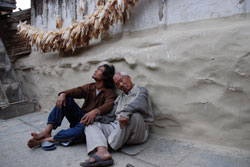|
|
| BEDROOM SCENE: Saugat Malla (Krishna) and Deeya Maskey (Tara) in a sequence from Kagbeni. This must be the boldest love scene ever in Nepali cinema, but it is done with finesse and is devoid of vulgarity. |
After watching Kagbeni when it premiers on Friday, many viewers will say it is the best Nepali movie they have seen. Trouble is, that's not saying much.
Given its inane mediocrity and crass imitation of Bollywood, anything would be better than Nepal's pubescent film industry. But even by international standards, Kagbeni is a handsome movie: superbly crafted, seductively acted, meticulously directed. No longer will we have to be embarrassed about Nepali movies. (See also: 'Aiming high with Kagbeni', #381)
The film starts with the starkly scenic panorama of the trans-Himalaya forming. Combine this ethereal location with a classic thriller (based on the 1902 novel by WW Jacobs, The Monkey's Paw) and for two hours you are transported into a Faustian dreamland.
The minimalist screenplay by Prashant Rasaily distills Jacobs down to a barebone plot. Krishna returns from Malaysia and is reunited with his childhood friend, Ramesh. But there is a sense of foreboding when they meet a sadhu who gives them a talisman with tantric powers. After this the story becomes a drama that unfolds at two levels: the real and the occult.
|
|
Director Bhusan Dahal does a surprisingly slick job, considering this is his first feature film, by getting everyone involved to give it their best. There is a perfectionist attention to detail in Dahal's direction. The characteristic up-valley gales of the Kali Gandaki blow through the cinema in surround sound, the faces of the actors are all weathered by sun and wind as they are in real-life Kagbeni. The film's languid pace fits perfectly with the way the hours in a day and the seasons pass in the mountains of rural Nepal.
The director has included local crudities: the lead actor wipes snot on his jacket, and Dahal even gets away with having a sleazy trader scratch his crotch in public. Empty brandy bottles clink in harmony with mule bells, creating music.
|
|
The soothing flute score by Sharad Gurung is a perfect accompaniment to the backdrop. Nothing is overdone, even though it must have been tempting to add more minutes of timelapse cinematography as the clouds race past Dhaulagiri. Bidur Panday restrains himself and has some excellent vertical shots that accentuate the stacked houses and narrow alleys of Lower Mustang.
The indoor scenes evoke the feeling of a stage set, and this is not surprising because leading actors Saugat Malla (Ramesh) and Deeya Maskey (Tara) are both from theatre. Malla does a stellar job first as a morose Ramesh, and nine years later as a responsible family man troubled by his past. Deeya's understated performance makes the soul-wrenching grief she has to portray towards the end even more powerful. Viewers may at first be sceptical of pop singer Nima Rumba (Krishna), but he puts on an strongly convincing performance.
|
|
Kagbeni may not be a Golden Globe nominee, but producers Bhaskar Dhungana, Nakim Uddin and Rajesh Siddhi have honed their skills with this debut effort, and may do even better with their next venture, Sano Sansar, due for release later this year. Kagbeni could have been shorter, the music during the supernatural scenes could have been less melodramatic, some characters are mechanical and detached. But overall this is a film that proves Nepali cinema has finally come of age. Even in a fairy tale, it protrays a gritty, dusty, real Nepal not a sanitised, escapist one seen in most Kollywood musicals.
As you wait in excruciating suspense for a climax that you know will be tragic, the moral of the story hits you even before the end rushes come on: "Be careful what you wish for."
Kagbeni will be shown from Friday, 11 January at Jai Nepal and Kumari (01-4442220) and in cinemas across Nepal in high definition digital format.






